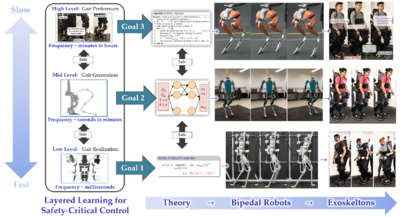Layered T&E for Safety-Critical Autonomous Systems
The overall goal of this project is to develop a layered safety-critical framework for test and evaluation (T&E) with a focus on (semi-) autonomous systems. We leverage the structure of layered architectures to design tests that evaluate the safety-critical nature of next generation systems, specifically the multiple time scales present in modern day systems: the planning layer (minutes), the trajectory generation layer (seconds), and the real-time control layer (milliseconds). We exploit models present at these different levels, and the interactions between the layers, to design tests that evaluate system specifications in a provably safe manner. This will be achieved through the use of safety filters around autonomy features -- including AI driven controllers -- the guarantee safe T&E. Additionally, we exploit the layered layered structure of software for autonomous systems to allow for computationally efficient approaches to T&E that facilitate the integration of data-driven methods in uncertain environments. The methods developed are being deployed experimentally on a wide-variety of robotic systems: from legged robots, to flying robots, to multi-robot systems with legged and flying robots.
|
Current participants: Additional participants: |
Collaborators:
Past participants:
|
Objectives

My groups goals under this project are focused on the following objectives:
- Data-driven T&E: Exploitation of data logging and data-in-the-loop testing in conjunction with the layered architecture to validate simulation- and regression-based elements of the certification process.
- Compositional T&E: Development of compositional approaches to T&E allowing a smaller number of more comprehensive tests to validate system specifications.
References
- Flow-Based Synthesis of Reactive Tests for Discrete Decision-Making Systems with Temporal Logic Specifications. Josefine B. Graebener, Apurva S. Badithela, Denizalp Goktas, Wyatt Ubellacker, Eric V. Mazumdar, Aaron D. Ames, Richard M. Murray. Submitted, IEEE Transactions on Robotics, 2024.
- Specifying and Analyzing Networked and Layered Control Systems Operating on Multiple Clocks. Inigo Incer, Noel Csomay-Shanklin, Aaron Ames, Richard M. Murray. To appear, 2024 Conference on Decision and Control (CDC).
- Efficient local validation of partially ordered models via Baysian directed sampling. Kellan Moorse and Richard Murray. Submitted, 2024 American Control Conference (ACC).
- Pacti: Scaling Assume-Guarantee Reasoning for System Analysis and Design. Inigo Incer, Apurva Badithela, Josefine Graebener, Piergiuseppe Mallozzi, Ayush Pandey, Sheng-Jung Yu, Albert Benveniste, Benoit Caillaud, Richard M. Murray, Alberto Sangiovanni-Vincentelli, Sanjit A. Seshia. Submitted, ACM Transactions on Cyber-Physical Systems (TCPS), Aug 2023.
Research supported by the AFOSR Test and Evaluation program, grant FA9550-22-1-0333
|
|
|